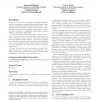Free Online Productivity Tools
i2Speak
i2Symbol
i2OCR
iTex2Img
iWeb2Print
iWeb2Shot
i2Type
iPdf2Split
iPdf2Merge
i2Bopomofo
i2Arabic
i2Style
i2Image
i2PDF
iLatex2Rtf
Sci2ools
GECCO
2007
Springer
2007
Springer
On the constructiveness of context-aware crossover
Crossover in Genetic Programming is mostly a destructive operator, generally producing children worse than the parents and occasionally producing those who are better. A recently introduced operator, Context-Aware Crossover, which implicitly discovers the best possible crossover site for a subtree has been shown to consistently attain higher fitnesses while processing fewer individuals. It has been observed that context-aware crossover is similar to Brood Crossover in that multiple children are produced during each crossover event. This paper performs a thorough analysis of these crossover operators and compares the performance of the two and demonstrates that, although they do work similarly, context-aware crossover performs a far better sampling of the search space and thus performs much better. We also demonstrate that context-aware crossover benefits from a speed up of almost an order of magnitude when using a simple and very small cache, which is over two orders of magnitute sm...
Context-aware Crossover | Context-aware Crossover Benefits | GECCO 2007 | Keywords Context-aware Crossover |
Related Content
| Added | 07 Jun 2010 |
| Updated | 07 Jun 2010 |
| Type | Conference |
| Year | 2007 |
| Where | GECCO |
| Authors | Hammad Majeed, Conor Ryan |
Comments (0)

